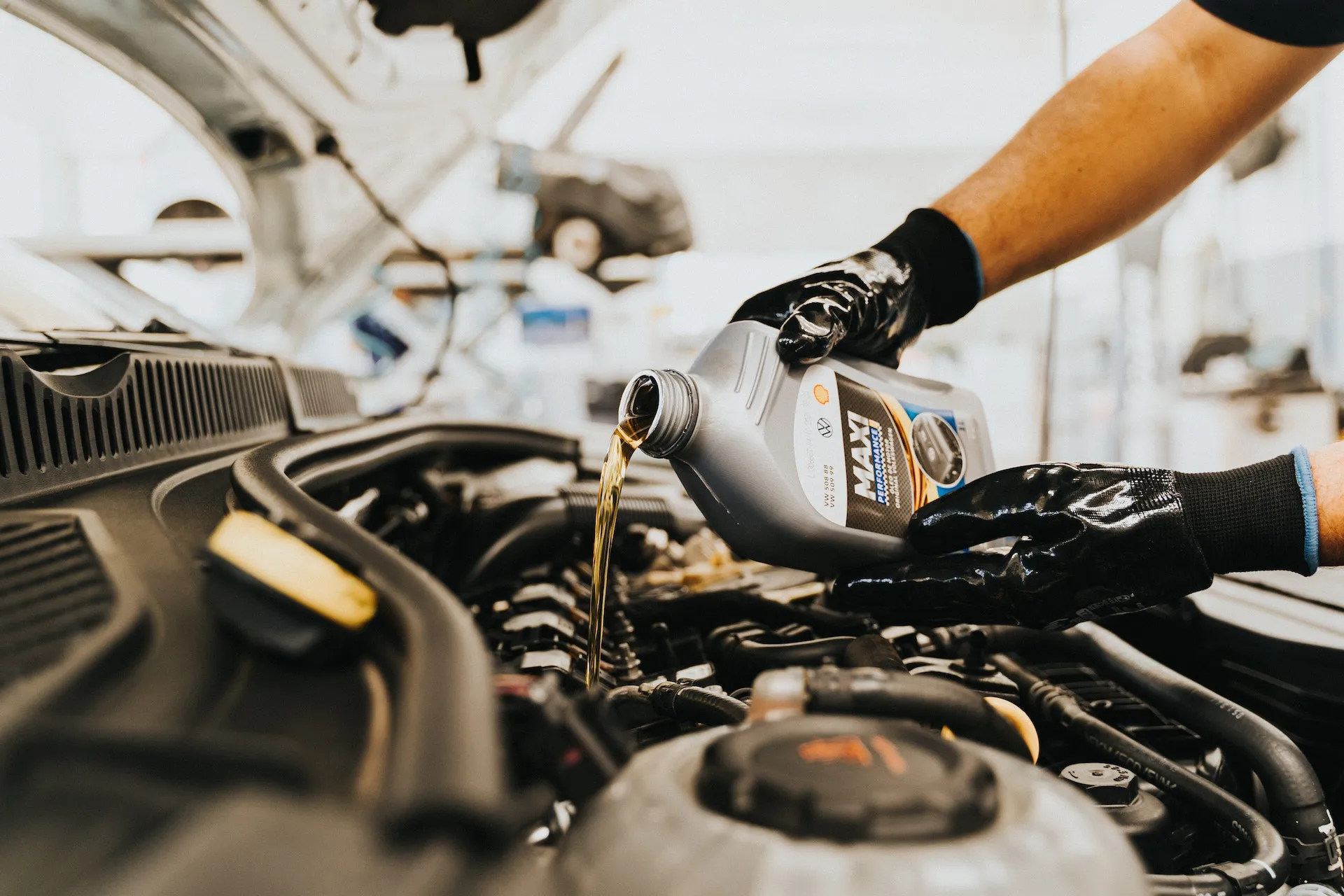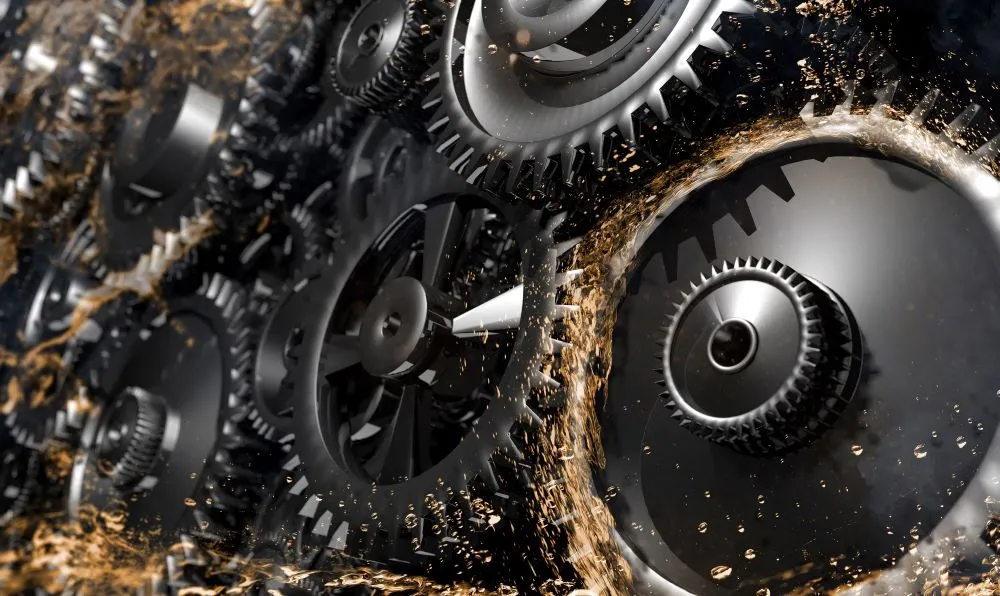Is Your Engine Not Working Properly?
Short Reads, Big Ideas

TRY THESE 10 THINGS
Your vehicle's engine is like the heart of your car. It's responsible for propelling you down the road and ensuring everything runs smoothly. When your engine isn't working as it should, it can lead to a wide range of problems, from reduced performance to breakdowns. But before you start panicking and assuming the worst, there are several things you can check and try to get your engine back in good shape. In this easy-to-understand guide, we'll explore ten common issues and solutions for when your engine isn't working properly.1. Check the Fuel
Sometimes, the most obvious solutions are the easiest to overlook. If your engine is sputtering or won't start, it might be running low on fuel or even out of it. Check your fuel gauge and ensure you have enough gas in your tank. If it's empty or nearly empty, a trip to the gas station might be all you need to get your engine running smoothly again.2. Look at the Battery
A weak or dead battery can cause your engine to struggle or not start at all. Check the condition of your battery by inspecting the terminals for corrosion and ensuring they're securely connected. If the battery is old or doesn't hold a charge, it may need to be replaced. Jump-starting your vehicle can also help if the battery is low.3. Inspect the Air Filter
A clogged or dirty air filter can restrict the flow of air into the engine, leading to poor performance. Take a look at your air filter, and if it's dirty, replace it with a new one. This simple step can improve your engine's efficiency and fuel economy.4. Verify the Fuel System
Problems in the fuel system, like a clogged fuel filter or a malfunctioning fuel pump, can lead to engine issues. Check the fuel filter for clogs and ensure that the fuel pump is working correctly. If you suspect fuel-related problems, it might be a good idea to consult a mechanic for a thorough inspection.5. Examine the Spark Plugs
Spark plugs play a vital role in the combustion process. Worn-out or fouled spark plugs can cause misfires, reduced power, and poor fuel efficiency. Inspect your spark plugs and replace them if they show signs of wear or fouling. Make sure you use the correct type and gap for your vehicle.6. Assess the Ignition System
A malfunctioning ignition system can result in starting problems and engine misfires. Check the ignition coil, distributor cap, and rotor (if your vehicle has them) for wear or damage. Replacing these components can help restore proper ignition and improve engine performance.7. Monitor the Coolant Level
Engines rely on a cooling system to prevent overheating. Low coolant levels can lead to overheating, which can cause severe engine damage. Check the coolant reservoir or radiator to ensure it's filled to the proper level. If it's low, top it up with the right coolant mix.8. Check for Vacuum Leaks
Vacuum leaks can disrupt the air-fuel mixture and result in engine hesitation, rough idling, and reduced power. To check for vacuum leaks, inspect the hoses, gaskets, and connections in your engine bay. If you find any damaged or disconnected components, replace or repair them.9. Evaluate the Exhaust System
A malfunctioning exhaust system can reduce engine performance and fuel efficiency. Inspect the exhaust pipes and muffler for damage, rust, or leaks. If you notice any issues, they should be addressed to ensure proper exhaust flow and emissions.10. Investigate the Check Engine Light
If your check engine light is illuminated on the dashboard, it's an indication that there's a problem with your engine. Use an OBD-II scanner to retrieve diagnostic trouble codes (DTCs) and identify the issue. These codes can provide valuable information about what's causing the problem, making it easier for a mechanic to diagnose and repair the engine.Conclusion
When your engine isn't working correctly, it can be a source of stress and frustration. However, many common engine issues can be resolved with simple inspections and maintenance. By checking your fuel, battery, and air filter and examining components like spark plugs and the ignition system, you can often identify and address the problem. Regular vehicle maintenance and routine inspections are crucial for preventing engine problems. If you encounter more complex issues or if the problem persists after checking these basic components, don't hesitate to seek professional assistance. A qualified mechanic can diagnose and repair more intricate engine problems, ensuring your vehicle runs smoothly and reliably. Remember that proper maintenance is the key to preventing engine problems. Following your vehicle's recommended service schedule and addressing issues promptly will help keep your engine in good working condition. By taking care of your engine, you'll enjoy a trouble-free driving experience and extend the life of your vehicle.newsletter
Subscribe to our newsletter for exclusive content and all of the behind the scenes details.
Most Popular
Understanding when to change your engine oil is crucial for the longevity and performance of your vehicle. However, there are varying opinions on how often this should be done. In this guide, we will break down the factors that influence oil change frequency and provide easy-to-follow recommendations to help you keep your engine running smoothly.
What Does Engine Oil Do?
Lubrication
Engine oil is essential for lubricating the various moving parts within your engine. Without proper lubrication, friction can cause severe damage, leading to costly repairs.Cooling
Oil also helps in cooling the engine by dissipating heat. This prevents overheating, which can lead to engine failure.Factors Affecting Oil Change Frequency
Type of Oil
The type of oil you use matters. Conventional oil may need more frequent changes than synthetic oil, which can last longer due to its superior properties.Driving Conditions
Frequent short trips or stop-and-go city driving may require more frequent oil changes than long highway journeys. This is because city driving can cause more wear and tear on your engine.Manufacturer Recommendations
Every vehicle has its maintenance schedule provided by the manufacturer. Following these guidelines is essential, as they are tailored to your specific make and model.General Guidelines for Oil Change Intervals
Every 3,000 Miles Myth
The old rule of changing your oil every 3,000 miles must be updated. Most modern vehicles can go longer between oil changes.5,000 to 7,500 Miles
Many experts recommend changing your oil every 5,000 to 7,500 miles for standard driving conditions and using conventional oil.7,500 to 10,000 Miles or More
Using synthetic oil, you can often extend oil change intervals to 7,500 miles or more, depending on your vehicle and driving conditions.Signs That It's Time For An Oil Change
Dashboard Warning Light
If your vehicle has an oil change indicator on the dashboard, follow it. It's usually based on your driving habits and the condition of the oil.Dark, Dirty Oil
If you check your oil and it's dark and dirty, it's a sign that it's time for a change. Fresh oil is amber in color.Strange Engine Noises
Unusual engine noises, such as knocking or ticking, can indicate poor lubrication, which may be due to old or insufficient oil.DIY vs. Professional Oil Changes
DIY Oil Changes
Changing your oil at home is cost-effective if you have the tools and know-how. Just ensure you dispose of the old oil properly.Professional Oil Changes
Professional oil changes provide convenience and ensure the job is done correctly. Many service centers also offer multi-point inspections during the process.Environmental Considerations
Proper Oil Disposal
Used oil is hazardous and should never be disposed of in the environment. Most auto parts stores and service centers accept used oil for recycling.Reducing Waste
Choosing a high-quality oil filter can reduce the number of oil changes, helping your wallet and the environment.Conclusion
In conclusion, the question of how often you should change your engine oil is a critical one for the health and longevity of your vehicle. While there isn't a one-size-fits-all answer, there are several key factors to consider in determining the correct oil change interval for your specific circumstances. First and foremost, it's important to recognize that the traditional rule of thumb, which suggests changing your oil every 3,000 miles, is outdated and doesn't necessarily apply to modern vehicles and engine oil technology. Today's engines and oils have become more advanced and are engineered to last longer, making the 3,000-mile guideline obsolete in many cases. One of the most crucial factors in determining your oil change frequency is the type of oil you use. Conventional oil generally requires more frequent changes compared to synthetic or synthetic-blend oils. Synthetic oils offer superior resistance to breakdown and sludge formation, which can extend the time between oil changes. However, it's important to consult your vehicle's owner's manual for specific recommendations, as some high-performance or specialty vehicles may have unique requirements. The driving conditions you typically encounter also play a significant role. If you mostly drive in severe conditions, such as stop-and-go traffic, extreme heat, or frequent short trips, you may need to change your oil more often. These conditions can put extra stress on your engine and oil, causing them to degrade more rapidly. On the other hand, if you do a lot of highway driving, your engine may stay cleaner, and the oil may last longer. Furthermore, advancements in engine technology have led to longer oil change intervals for many vehicles. Some modern cars are equipped with oil life monitoring systems that take into account factors like engine temperature, RPM, and driving habits to provide more accurate oil change recommendations. Trusting these systems and following the manufacturer's guidelines can help you optimize your oil change schedule. Additionally, if you're inclined to change your own oil, be sure to dispose of the used oil properly. Recycling used motor oil is not only environmentally responsible but also essential for reducing the negative impact on our ecosystems. Many auto parts stores and repair shops accept used oil for recycling, making it easy to do your part in protecting the environment.Machinery is the backbone of modern industry and our daily lives. From the engines in our cars to the massive turbines in power plants, these machines are the workhorses that keep our world running. However, even the most robust machines can succumb to wear and tear over time. That's where lubricants come into play. The efficient functioning of machinery is heavily dependent on the quality and application of lubricants. In this blog, we will explore how lubricants can significantly improve the efficiency of your machinery, extending its lifespan and reducing operating costs.
1, Friction Reduction
Friction is the enemy of machinery. When two or more moving parts come into contact, friction generates heat and causes wear. This wear not only shortens the lifespan of components but also reduces the overall efficiency of the machine. Lubricants act as a barrier between moving parts, reducing friction and dissipating heat. This results in less wear and tear, smoother operation, and, ultimately, improved efficiency. For example, in your car's engine, oil is used to lubricate various components such as the pistons, crankshaft, and camshaft. Without proper lubrication, these parts would quickly wear out due to the intense heat and friction generated during operation. The right oil not only reduces friction but also helps maintain a consistent temperature, ensuring optimal engine performance.2. Corrosion Prevention
In addition to reducing friction, lubricants protect machinery from corrosion. When metal parts are exposed to air and moisture, they can rust and deteriorate, leading to inefficiency and component failure. Lubricants create a protective barrier that prevents moisture and oxygen from coming into contact with the metal surfaces, reducing the risk of corrosion. Marine equipment, for example, faces constant exposure to salty seawater, a particularly harsh environment for machinery. The use of specialized marine lubricants helps prevent corrosion and ensures the efficient operation of marine engines and equipment.3. Improved Energy Efficiency
Efficiency in machinery often translates to energy efficiency. When your machinery operates with less friction and wear, it requires less energy to perform the same tasks. This is especially critical for industrial machinery and manufacturing processes where energy costs can be a significant part of the operating budget. Consider the case of large industrial pumps used in water treatment facilities. Proper lubrication of the pump bearings and seals reduces friction and the energy required to move water through the system, resulting in lower energy consumption and, in turn, cost savings.4. Extended Machinery Lifespan
Lubricants don't just improve the efficiency of machinery; they also extend its lifespan. When components are well-lubricated and protected from wear and corrosion, they tend to last longer. This means fewer replacements and repairs, reducing downtime and maintenance costs. In the construction industry, heavy equipment like excavators and bulldozers are subjected to demanding conditions. These machines are often required to operate in dusty, abrasive environments. Proper lubrication ensures that the internal components are shielded from these harsh conditions, helping to extend the lifespan of the equipment.5. Temperature Control
Machinery often generates a significant amount of heat during operation. Excessive heat can lead to component failure and reduced efficiency. Lubricants help control and dissipate this heat by providing a protective layer on moving parts. In high-temperature environments, such as those found in steel mills, the performance of machinery can be greatly affected by heat. Specialized high-temperature lubricants are used to maintain machinery efficiency by withstanding extreme heat and providing the necessary protection to keep equipment running smoothly.6. Noise Reduction
In addition to the practical benefits, lubricants can also contribute to a quieter and more comfortable working environment. Properly lubricated machinery generates less noise because there is less metal-to-metal contact and friction. This can be particularly important in industries where noise pollution is a concern, such as manufacturing plants or residential areas near industrial facilities. For instance, in the food processing industry, conveyors and packaging equipment can produce a lot of noise during operation. By using lubricants specifically designed for this sector, manufacturers can reduce noise levels and create a more pleasant working environment for employees.7. Environmental Impact
Efficiency and sustainability often go hand in hand. Proper lubrication not only benefits the machinery but can also have a positive impact on the environment. By reducing friction and wear, machinery consumes less energy, which translates to reduced greenhouse gas emissions and a smaller carbon footprint. In the world of transportation, where emissions are a significant concern, lubricants play a crucial role in improving the efficiency of engines. Low-friction engine oils and transmission fluids help increase fuel efficiency, which, in turn, reduces the overall carbon emissions associated with driving.8. Maintenance Costs Reduction
Effective lubrication minimizes the need for costly maintenance and repairs. When machinery operates efficiently, the risk of sudden breakdowns and unexpected downtime is reduced. This translates to lower maintenance costs and a more predictable budget. In the aviation industry, where maintenance costs are substantial, the importance of lubrication cannot be overstated. Aircraft engines require high-quality lubricants to ensure they function optimally. The use of these lubricants reduces maintenance requirements and keeps planes in the sky, where they belong.9. Specific Applications and Customization
Not all machinery is the same, and not all lubricants are interchangeable. Different types of machinery require specific lubricants tailored to their unique needs. This is where customization comes into play. Lubricant manufacturers often produce a range of products to cater to different industries and applications. Agriculture, for example, relies on a wide variety of machinery, from tractors to combines. Each of these machines operates under different conditions and stress levels. Customized lubricants for agriculture are designed to withstand the specific demands of farming equipment, ensuring efficient operation.Conclusion
In conclusion, the significance of lubricants in improving the efficiency of machinery cannot be overstated. Lubricants play a multifaceted role in ensuring the smooth operation and longevity of various mechanical systems. First and foremost, lubricants reduce friction, which is a primary cause of wear and tear in machinery. By creating a protective barrier between moving parts, they minimize the heat generated during operation, resulting in less wear and ultimately extended equipment lifespan. Moreover, lubricants also aid in the prevention of corrosion, especially in harsh or humid environments. They shield metal components from moisture and oxidation, reducing the risk of damage and further enhancing the efficiency of machinery. In essence, the choice of the right lubricant and diligent maintenance can result in prolonged machinery life, reduced operational costs, and a more eco-friendly operation. Therefore, it is imperative for industries and individuals alike to recognize the pivotal role that lubricants play in enhancing the efficiency of machinery while simultaneously benefiting the environment.Regular oil changes are one of the simplest yet most crucial maintenance tasks you can perform to keep your vehicle running smoothly. Engine oil plays a vital role in lubricating engine components, reducing friction, and maintaining the overall health of your vehicle. But what happens if you neglect this essential task and skip your oil change schedule? In this blog, we will explore the potential consequences of not getting an oil change and why it's vital to adhere to your recommended maintenance intervals.
1. Increased Friction and Wear
Engine oil serves as a lubricant that prevents metal-to-metal contact between moving engine components. When you skip oil changes, the oil in your engine becomes less effective at reducing friction. As a result, the engine parts, such as the pistons, crankshaft, and camshaft, rub against each other with increased friction. This leads to accelerated wear and tear, reducing the lifespan of critical engine components. Over time, the increased friction can cause severe damage, which may necessitate costly repairs or even engine replacement. These repairs can far outweigh the cost of routine oil changes, making it clear that regular maintenance is a wise investment.2. Overheating
Engine oil has another crucial function: it helps dissipate heat generated during the combustion process. As oil circulates through the engine, it carries away excess heat, preventing the engine from overheating. When you neglect oil changes, the oil becomes less effective at heat dissipation due to contamination and degradation. Without proper heat control, the engine temperature can rise to dangerous levels, leading to overheating. Overheating can cause severe engine damage, such as warping of engine components, blown head gaskets, or even engine block cracks. These issues are not only expensive to repair but can also leave you stranded on the side of the road.3. Sludge Buildup
As oil circulates through the engine, it can accumulate contaminants, such as dirt, metal particles, and combustion byproducts. Over time, these impurities settle and form a thick, sludgy substance within the engine. This sludge not only reduces the oil's ability to lubricate and protect the engine but also clogs oil passages and can starve critical components of proper lubrication. When sludge buildup occurs, it can lead to poor engine performance, decreased fuel efficiency, and increased wear. In extreme cases, it can even block oil passages, causing complete engine failure. Addressing sludge buildup usually requires costly engine flushes and repairs that could have been avoided with regular oil changes.4. Reduced Fuel Efficiency
A well-lubricated engine operates more efficiently, which translates to better fuel economy. Neglecting oil changes can lead to increased friction and heat, both of which can reduce engine efficiency. A less efficient engine requires more fuel to produce the same amount of power, resulting in decreased gas mileage. In an era where fuel costs are a significant concern for many, preserving fuel efficiency is crucial. Regular oil changes are a simple yet effective way to help maintain your vehicle's gas mileage and save money in the long run.5. Engine Knocking and Noises
When your engine is not properly lubricated due to a lack of oil changes, you might start to notice unusual noises, such as knocking or ticking sounds. These noises are often early indicators of severe engine problems. The knocking sounds, for instance, can be caused by excessive friction between engine components, leading to premature wear and damage. Ignoring these noises can result in further engine damage and more significant repair costs down the road.6. Reduced Engine Power
An engine that lacks proper lubrication and is filled with dirty or degraded oil is bound to experience a reduction in power. This means your vehicle may not accelerate as quickly, struggle when climbing hills, and feel less responsive overall. If you depend on your vehicle for work, transportation, or leisure, this loss of engine power can be frustrating and inconvenient. It's a clear indication that regular oil changes are essential to keep your vehicle performing at its best.7. Increased Emissions
Neglecting oil changes not only affects the health of your vehicle but also has environmental consequences. When your engine operates with contaminated or degraded oil, it tends to produce higher emissions. These emissions can contribute to air pollution and environmental degradation. In an era where environmental responsibility is a growing concern, it's essential to ensure your vehicle is running cleanly and efficiently. Regular oil changes help reduce emissions and minimize your carbon footprint.8. Expensive Repairs
When you disregard regular oil changes, you are essentially gambling with the longevity of your engine. The potential consequences of engine damage due to neglected oil changes can be financially crippling. Repairing or replacing an engine is a substantial expense that could have been prevented by a simple and relatively inexpensive oil change.Conclusion
In conclusion, the consequences of neglecting oil changes can be dire. From increased friction and wear on engine components to overheating, sludge buildup, reduced fuel efficiency, and engine knocking, the damage can be severe and costly. Additionally, neglecting oil changes not only puts your vehicle's performance and longevity at risk but also contributes to increased emissions and environmental harm. Regular oil changes are one of the most straightforward and cost-effective ways to maintain your vehicle's health and efficiency. By adhering to your manufacturer's recommended oil change schedule, you not only prolong the life of your engine but also save yourself from potentially expensive repairs and the inconvenience of unexpected breakdowns. Remember that prevention is often far more affordable and less stressful than dealing with the consequences of neglect. So, when it comes to oil changes, don't skip them – your vehicle's health and your wallet will thank you.Orcam Lube specialise in manufacturing and
supplying top-quality lubricants for industrial
machinery and vehicles throughout the UAE
and the Middle East.
Orcam Lube specialise in manufacturing and supplying top-quality lubricants for industrial machinery and vehicles throughout the UAE and the Middle East.
Follow On
Contact
- +971 4 3933412
- Info@orcamlube.com
- New Industrial Area, Al Jurf, Ajman, United Arab Emirates.




